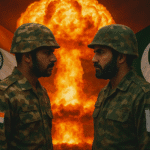As President Donald Trump crosses the 100-day mark of his second term, the political winds have shifted sharply against him. Domestically, his administration is battered by plunging approval ratings, legal battles, and an economy showing troubling signs of contraction. But it’s the storm brewing overseas that may prove the most consequential. With Israel deepening its military campaign in Gaza and Iran leveling accusations of provocation, the United States finds itself edging closer to a dangerous entanglement in the Middle East, raising questions about whether current policy is steering the nation into another prolonged conflict.
The catalyst for this crisis is Israeli Prime Minister Benjamin Netanyahu’s bold military strategy. His launch of “Operation Gideon’s Chariots” has been framed as an all-out effort to dismantle Hamas and secure the release of Israeli hostages. Israeli forces have pressed deep into Gaza, capturing key territory while pushing hundreds of thousands of civilians southward. Netanyahu’s government portrays the operation as essential for national security, yet critics argue it risks triggering wider regional instability. Among those critics is Iran, which has accused Netanyahu of deliberately dragging the United States into what it calls a “disaster” for the Middle East.
Iran’s rhetoric is more than just diplomatic posturing. The Islamic Republic has reiterated its readiness to respond militarily if Israel’s campaign escalates further. Until recently, Iran-backed Houthi rebels in Yemen had intensified attacks on shipping in the Red Sea, prompting repeated U.S. military strikes. However, as of May 6, 2025, the U.S. and the Houthis reached a ceasefire agreement brokered by Oman, under which the Houthis pledged to halt attacks on American vessels. In response, the U.S. suspended its airstrikes and began drawing down its naval posture, including the USS Harry S. Truman strike group. Despite this breakthrough, the Houthis have declared that their attacks on Israeli and Israeli-linked ships will continue unabated, keeping regional tensions high. Shipping companies remain wary, with insurance premiums still elevated and many carriers maintaining detours around the Cape of Good Hope, reflecting ongoing uncertainty about maritime security in the region.
At home, President Trump’s political standing has taken a beating. His approval rating has slid below 40%, driven by economic uncertainty, rising prices, and growing public frustration with his hardline immigration policies and sweeping trade tariffs. Analysts point to a stagnant job market and inflationary pressures that have made everyday life harder for millions of Americans. Many see his foreign policy as a distraction from pressing domestic problems, accusing the administration of prioritizing military muscle abroad over economic recovery at home.
The president, however, appears undeterred. His speeches in recent weeks have leaned heavily into themes of strength, resolve, and unwavering support for Israel. At rallies, he has promised that the United States will “stand shoulder to shoulder” with its ally and “not back down from the enemies of freedom.”
Yet behind the rhetoric lies a more complicated reality. The administration’s diplomatic efforts with Iran, including indirect nuclear negotiations, remain fragile. Iran’s leadership, meanwhile, views U.S. actions as an unmistakable tilt toward war, heightening the risk of a direct confrontation.
The unease is reflected in a flurry of travel advisories issued by the U.S. State Department. Americans have been warned to avoid travel to Iran, Yemen, Syria, and other hotspots in the region. The advisories cite risks of terrorism, arbitrary detention, and the potential for rapidly changing security conditions. Families of U.S. diplomats in several countries have been authorized to depart, and embassies are quietly scaling back non-essential staff. The specter of conflict looms large, raising fears that a single misstep could ignite a broader war involving not only Israel and Iran, but their proxy forces spread across Lebanon, Iraq, and Yemen.
Within military circles, there is growing concern that current U.S. policy is reactive rather than strategic. By extending deployments and intensifying operations in response to each new threat, the administration risks becoming trapped in a cycle of escalation without a clear endgame. Military officials warn that the shifting alliances and volatile dynamics of the region make it dangerously easy to miscalculate. A strike intended to deter could instead provoke; a show of strength could invite challenge. Yet amid these warnings, the administration shows little sign of recalibrating.
Trump’s defenders argue that his approach reflects the realities of a region where strength is the only currency that matters. They see his backing of Netanyahu as essential for maintaining U.S. credibility and deterring Iranian aggression. But critics worry that this policy of unconditional support emboldens Israeli hardliners while alienating key Arab partners. Already, voices from Cairo, Amman, and Riyadh have expressed unease with the scale of Israel’s Gaza operation and the absence of meaningful diplomatic pressure from Washington to rein it in.
As the situation unfolds, the president faces a narrowing set of options. Backing down risks signaling weakness and emboldening adversaries. Staying the course risks deeper military entanglement and rising anti-American sentiment across the region. And with the domestic political clock ticking toward midterm elections, the window for bold diplomatic initiatives is closing fast.
The danger is not merely theoretical. Every day brings new reports of rocket fire, drone attacks, and naval clashes. The region’s powder keg grows more volatile, even as global markets watch nervously. Energy prices have spiked, shipping insurers are tightening coverage, and military planners are war-gaming scenarios that only months ago seemed improbable.
For now, Washington insists that its goal is to contain the conflict and support regional stability. But containment may already be slipping out of reach. With Netanyahu pressing his offensive, Iran vowing retaliation, and U.S. forces increasingly drawn into the fray, the path forward grows darker. Some observers fear history repeating itself—a slow, steady march from limited engagement to open-ended war.
In the end, the question facing the administration is whether its current trajectory is sustainable—or whether, as critics warn, it is steering the United States toward another Middle East quagmire. The stakes are enormous, and the clock is ticking. And as the president doubles down on his course, the echoes of past interventions grow louder, serving as both a warning and a reminder of the cost of wars without exit strategies.















